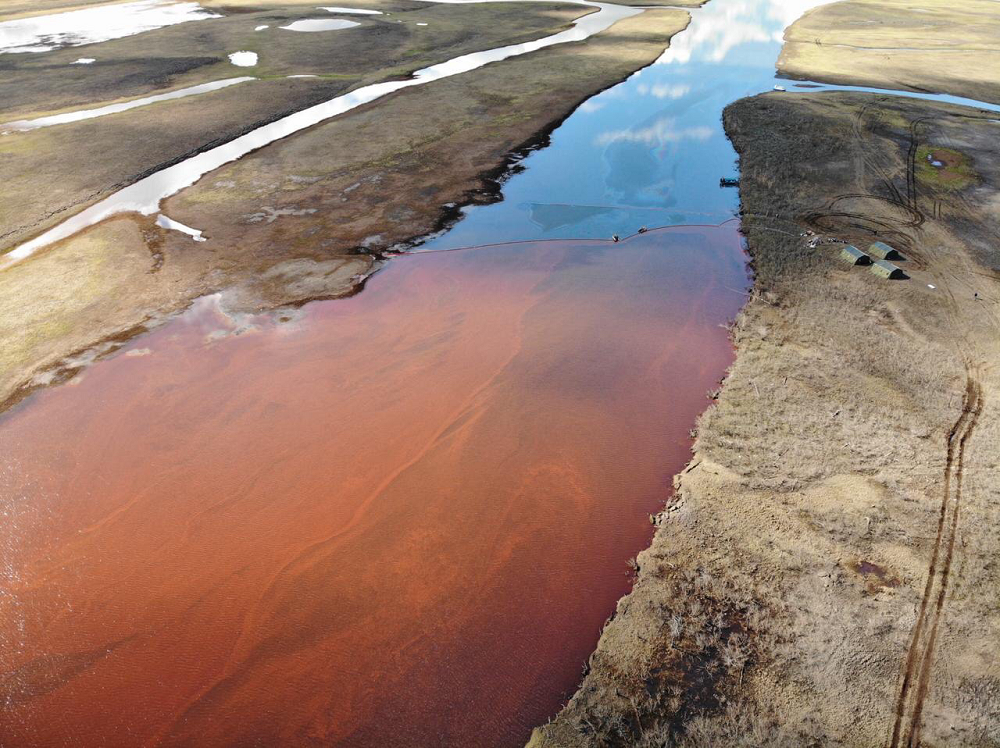
Criminal investigators in Russia have launched inquiries into several individuals with links to a huge diesel spill in the Norilsk region of the country’s Arctic north.
Around 21,000 tonnes of fuel leaked from a storage tank at the TPP-3 power plant operated by Norilsk-Taimyr Energy Company (NTEK) – a subsidiary of Russian miner Norilsk Nickel (Nornickel) – on 29 May, following a structural failure.
Recovery efforts to contain the diesel spill around the industrial city of Norilsk have been underway since the incident and a state of emergency has been declared in the region, while the mining firm said this week that the first stage of the clean-up is now complete.
Meanwhile, Russia’s federal Investigative Committee has launched a series of criminal probes to determine the causes of the spill, and to assess whether there is a case for negligence charges.
Russian Investigative Committee opens cases against multiple people in connection with Norilsk diesel spill
According to the authority, Elena Novozhilova, an inspector for the Rostekhnadzor supervisory agency tasked with industrial safety assessments in the region, is being investigated over alleged failings to report on the state of the facility before the spill.
It said: “In November 2017 and December 2018, Novozhilova conducted scheduled inspections of TPP-3 in Norilsk. At the same time, according to the investigation, she did not check the emergency tank and did not reveal the fact of the absence of a positive conclusion of an industrial safety review on it.
“In 2019, Rostekhnadzor received an expert opinion on industrial safety, which indicated shortcomings that needed to be addressed. In this situation, Novozhilova was supposed to initiate an unscheduled inspection of the facility, but this was also not done.”
Last week, three senior officials at the plant – director Pavel Smirnov and engineers Alexey Stepanov and Yuri Kuznetsov – were detained for allegedly violating environmental protection rules by allowing the storage tank to be operated, despite knowledge that it did “not fully comply with industrial safety requirements” and required repairs.
Nornickel – the world’s largest producer of palladium and one of the largest nickel, copper and platinum producers – denies claims of negligence, saying the collapse of the tank’s supports was a result of unusually warm weather that softened the permafrost on which the facility is built, disrupting the foundations of a structure that has “served accident-free for more than 30 years”.
The firm’s operational director Sergey Dyachenko said: “We can assume that permafrost could thaw as a result of abnormally mild temperatures, which led to a partial subsidence of the supports on which the tank stands.”
A criminal negligence case has been launched against the mayor of the industrial city of Norilsk, Rinat Akhmetchin, who is accused of “failure to fulfil his duties” in the immediate aftermath of the incident.
A statement from the Russian Investigative Committee added: “Akhmetchin, being aware of the amount of fuel spilled from the tank, did not take proper measures to respond to the emergency and to eliminate its consequences.”
The allegations refer to a failure to appropriately co-ordinate the relevant local authorities or organise a response of environmental control and monitoring.
Nornickel says 90% of the spilled fuel has now been collected
The fallout from the environmental disaster has sparked conflicting accounts about the causes of the storage-tank leak, as well as the response of Nornickel and regional authorities.
Russian president Vladimir Putin, who has publicly expressed frustration with the handling of the incident, has declared a state of emergency in the region to mobilise federal resources towards the clean-up effort.
Following the storage-tank collapse, diesel leaked into nearby waterways including the Ambarnaya and Daldykan rivers.
The Krasnoyarsk region’s governor Alexander Uss last week said this contamination had spread into Lake Pyasino, roughly 20 kilometres north of the power plant, although Nornickel has denied this claim, saying the spill has been contained using a series of floating booms.
According to an update from the mining firm yesterday (16 June), “a significant part” of the 21,000 tonnes of spilled fuel has now been collected, including around 30,500 cubic metres of fuel-water mixture pumped out of the surrounding waterways, and the excavation of 84,000 tonnes of contaminated soil.
Dyachenko said: “We collected more than 90% of the spilled fuel, about 70% of the contaminated soil. Now the task is to dispose of the collected contaminated soil and water-fuel mixture, as well as clean the coastline.”
Clean-up costs could impact Norilsk Nickel dividend
Nornickel has estimated the cost of the clean-up operation to be around 10 billion rubles ($146m) although environmental groups suggest the overall figure could be much higher with the recovery effort expected to last for decades.
The Russian branch of the World Wide Fund for Nature (WWF) has called for the contaminated site to receive “close attention and public control even after completion of the work”.
“It is the only way to influence and make Norilsk Nickel fulfil its obligations to eliminate the consequences of the disaster and restore disturbed ecosystems,” it added.
“There is still a lot of work ahead, and it is premature to announce the successful resolution of the situation.”
Yesterday, Rusal, the aluminium producer whose parent company En+ owns almost 28% of Norilsk Nickel, said it would defer a decision on its approach to dividend payments until the full scale of the financial hit has been determined.
Nornickel’s largest shareholder and chief executive, Vladimir Potanin, has suggested capping this year’s payment at $1bn – a significant drop from the $4.8bn distributed to shareholders in 2019 – as it prepares to foot the bill of the clean-up costs.
Rusal said in a statement: “We are ready to consider specified size of payments, once the shareholders are informed of the exact size of the losses. We also expect that further negotiations will be held in the format outlined in the agreement, instead of via public discussions that have a significant impact on the share price.”






